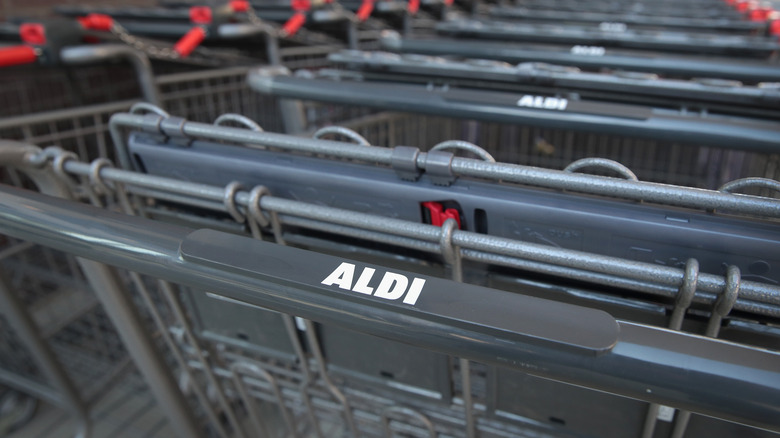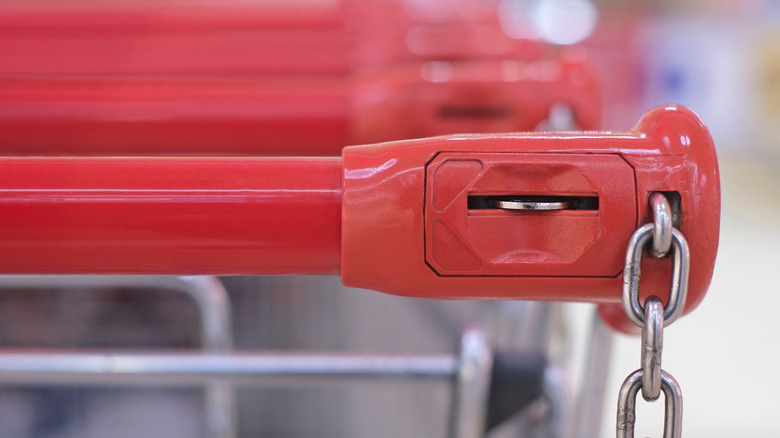Why Does Aldi Require A Quarter To Get A Cart?
"Fiddlesticks." You're standing in front of an Aldi shopping cart corral and you've forgotten your quarter. Now you'll either have to opt for a hand-basket or precariously wrap your limbs around the items on your lengthy grocery list. With a frozen turkey and a case of Coke among your necessities, this simply isn't going to work. You would give anything to have access to a shopping cart right this minute. Even one with a wonky wheel.
It wasn't always that way though. There was a time when men and women gladly eschewed the useful cart, instead opting to manhandle their wares. One Oklahoma grocery store owner often called "the father of the modern shopping cart," Sylvan Goldman, told CNN he introduced the cart to his shop with great anticipation. He was disappointed on the cart's inaugural day, however. His store was filled with shoppers, but no one wanted a cart. Apparently, the women were weary of pushing strollers around and didn't want to push something else. Men said that carts "made them look weak," opting to showcase their muscle by lugging a basket instead. You aren't out to flex your athletic prowess though. You simply want a cart.
Ironically, a Washington Post reporter shared that they once saw 11 stray grocery carts in their neighborhood while out for a walk. Yet, here you are surrounded by carts and you can't access a single one. Why oh why does Aldi require you to deposit a coin?
Retailers lose $800 million in carts every year
The best way to answer that question is to go straight to the source. Aldi's website contends that by charging a cart deposit, they won't need to hire someone to retrieve the carts. They say that the customer will, in turn, reap these savings. But that's only a fraction of the big picture. The Calgary Herald reports that the Food Marketing Institute in Washington, DC estimated that businesses around the world lose about $800 million in lost shopping carts every year. People simply "borrow" them and abandon them near their homes. The same outlet reports that in New York state the average grocery store can suffer a loss of $10K in carts annually. And in the summer of 2021, a San Francisco Safeway kissed 160 shopping carts goodbye in one month. These are substantial thefts that can create a massive dent in a business's bottom line, not to mention that a store cannot function properly without its carts.
To illustrate this, The Washington Post describes a Safeway in Southeast Washington that is so short on shopping carts that customers have to wait in the lobby until someone comes out with a cart. One employee says the store "buys hundreds of new carts every month and almost all of those walk out the door," while another pointed out that the money would have been better spent on carts that can't be stolen. The required Aldi deposit is meant to encourage shoppers to return their carts.
Some stores have taken further security measures
There are stores in other regions that charge more than a quarter. In Canada, many stores that operate within the Loblaw chain charge a loonie (a Canadian dollar) for a cart. Unfortunately, this doesn't stop some people from stealing them, forcing stores to take further action. For example, CTV News offers that Shoppers Drug Mart has installed a costly wheel-lock system, ensuring that "as soon as a cart is taken off the property the wheels lock up." The grocery cart conundrum has spread as far as Australia with The Canberra Times reporting that thanks to a government push, Australia's Aldi, Woolworths, Target, and other chains now have "coin-operated locks" on their carts.
Charging a deposit for a cart is not a new development either. Back in 1985, the Los Angeles Times reported that several California grocery stores required a quarter for the use of a shopping cart. While some customers were initially annoyed, several admitted that it kept carts from winding up in residential neighborhoods. And, even more important to customers was the fact that deposit fees prevented stray carts from taking up parking spots and causing damaging dings in the parking lot.
Whether you are pro-deposit fee or you staunchly oppose them, the fact is that they are here to stay. You may as well grab your quarter and unleash your cart. Your weekly grocery shopping awaits.


